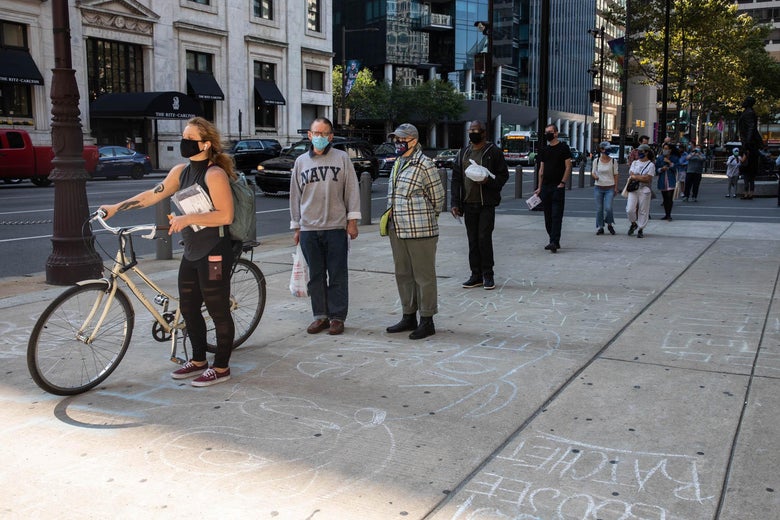What would make a Supreme Court ruling like Bush v Gore seem more defensible, if Trump's allegations of voter fraud don't seem convincing enough? The destruction of large numbers of ballots.
The attacks on ballot boxes have begun:
'
Blaze Sunday night appeared to be intentional
A fire inside an official election drop box in Los Angeles county has damaged voters' ballots and is under investigation for arson
[...] The fire required firefighters to spray water into the box to extinguish the flames, likely causing significant damage. Video from the scene showed dozens of wet and burnt ballots.'
https://www.theguard...ed-arson-attack
I hope they're sufficiently prepared against arson, bombings, and militia attacks at locations where ballots are being stored....
Looks like the post-Barrett court will rule that state legislatures do not have to go by the state constitution when it comes to voting or choosing electors:
'In a 4–4 Split, the Supreme Court Lets Pennsylvania Make Voting Easier—for Now
[...] "The final argument that Republicans are advancing is the boldest and perhaps most dangerous one. The argument is that when state supreme courts apply their state constitutions' provisions protecting a right to vote to loosen voting rules in a pandemic, these state courts are usurping the power given by the Constitution to state legislatures to set the manner for conducting presidential elections. The argument echoes an argument that three conservative justices on the Supreme Court accepted in the 2000 Bush v. Gore case ending that presidential election. It's a dangerous idea that a state court applying a state constitution is taking away legislative power, particularly in states like Pennsylvania where the state legislature has itself approved the constitutional provisions being applied.
But this argument is likely to resonate with at least some of the conservative justices on the court. [...] state legislatures could try to disenfranchise voters and take back their power to appoint presidential electors directly even after the votes are counted."
Now we know that this hotly contested question deeply divided the justices. It took them almost two weeks to issue an order, and no one ended up writing a dissent. Instead, Chief Justice Roberts sided with the court's liberals in voting to not grant a stay. All the other conservative Justices would have granted a stay, meaning they likely agreed with the state's argument. (It is possible they agreed with a different argument made by state Republicans, but if they did, they did not say.)
[...] it means that we have no guidance from the court as to when and whether a state Supreme Court can rely on a state Constitution when it expands or changes state voting rules in a presidential election. Even though Democrats opposed the stay sought by Republicans in the case, they begged the Court to fully take the case and give an explanation as to the scope of state court power in this case. This lack of guidance could be a huge problem in the two battleground states—North Carolina and Pennsylvania—with Democratic state Supreme Courts and Republican legislatures who could battle over any post-election voting rules.
Further, it shows that President Trump was right about the role that Judge Amy Coney Barrett could play in any post-election litigation over the winner of the November election. He has said he wants Barrett on the Supreme Court to decide such a case.'
https://slate.com/ne...-law-order.html
'
[...] blocked the lower court's orders [...] that would have required officials to notify Texans whose mail ballots were rejected because of an apparent signature mismatch and give them an opportunity to address the issue. Under current law, election officials can reject a mail ballot if they determine that the signature does not match the voter's signature on file; officials must notify the voter of the rejection within 10 days. But even then, the voter may not be given an opportunity to fix the problem.
[...] "The state election code does not establish any standards for signature review, which is conducted by local election officials who seldom have training in signature verification."
So at best, the disposal of ballots may be entirely capricious. At worst, it could disproportionately target groups of voters that the existing government would rather not have voting — minority groups, for instance, that may be likely to vote Democrat. It may be hard to say what the motivation is for the laws in this particular case, but the GOP's actions in the past decade have made clear that they see restricting the right to vote as a vital part of retaining electoral power. The court's reasoning lays bear this motivation: Based on the slimmest fears about "voter fraud," they can justify restricting voters' rights as much as possible.
[...] In a remarkable sentence encapsulating the emerging right-wing view of voting rights, the decision explained:
"Because Texas's strong interest in safeguarding the integrity of its elections from voter fraud far outweighs any burden the state's voting procedures place on the right to vote, we stay the injunction pending appeal."
While this may sound like dry legalese, it's a dramatically bold and unambiguously dangerous idea. The court's claim is that "any burden" on the right to vote can be justified if it is meant to restrict the opportunity for voter fraud.
This notion sounds like a farcical caricature of Republicans' views on voting, but it's an actual statement from right-wing judges defending a right-wing administration. It falls apart under even the mildest scrutiny though. While preventing voter fraud is surely a legitimate interest of the state, there must be some reasonable limits on how far the government can go in trying to prevent it.
[...] justified the stay in part by arguing against the idea that there's a due process protection for the right to vote. But even if there is, the court argued, there isn't a right to vote by mail — that's simply an option that Texas provides without being obligated to.
This reasoning, though, is spurious. If Texas provides voters the option to vote by mail, it is not reasonable that it can then simply reject those ballots based on dubious and unreviewable claims of a signature mismatch that the voter may not even be alerted to until after Election Day has passed.'
https://www.alternet...against-voting/
'If your signature has changed over the years, absentee voting may not be the best option. Because voters can't use an ID to prove who they are, as they do at the polls, elections office staffers scrutinize the signatures on absentee ballot envelopes.'
https://www.nydailyn...?outputType=amp
Thought I wouldn't have to have to worry about that in my state:
'
Pennsylvania: Mail ballots can't be discarded over signature
With concerns rising in Pennsylvania that tens of thousands of mail-in ballots will be discarded in the presidential election over technicalities, officials in the presidential battleground told counties they aren't allowed to reject a ballot solely because an election official believes a signature doesn't match the one in the voter's file.'
But now it looks like that too will be decided by the Barrett Court, after the State Supreme Court decision is appealed:
'Pennsylvania Supreme Court [...] will again decide on a crucial aspect of electoral administration in the swing state: whether counties are authorized or required to reject ballots on the basis of signature analysis.
[...] warned that thousands of Pennsylvania voters would be disenfranchised if "arbitrary signature comparisons and challenges to signature variations are allowed to be used as a basis for rejecting mail and absentee ballots," is seeking a declaration that counties may not reject applications or voted ballots because of a "subjective perception of signature variation."'
https://www.post-gaz...es/202010140152
Damn, I hope I can find out exactly what my signature looks like on my voter registration card... though hopefully the people evaluating the signatures locally won't be Republicans.....
This post has been edited by Azath Vitr (D'ivers: 20 October 2020 - 03:11 AM


 Help
Help



















